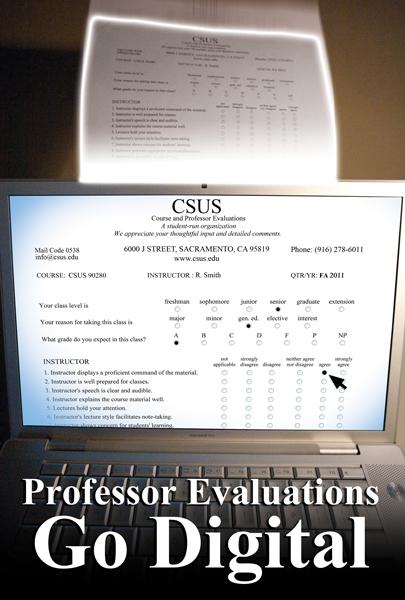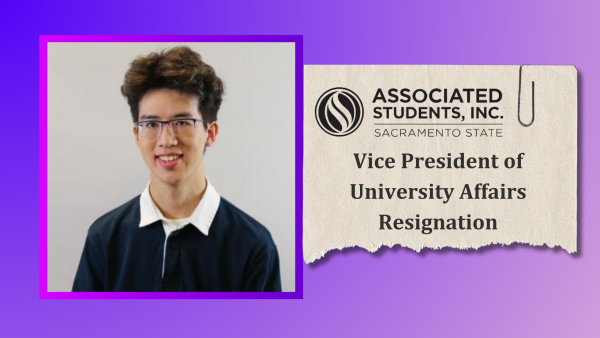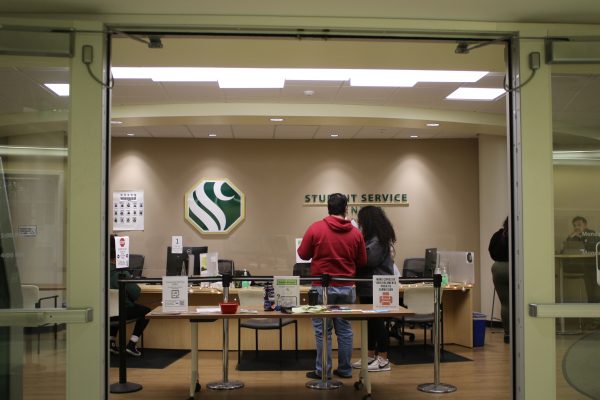University looks to take teacher feedback online

October 19, 2011
The California Faculty Association and Sacramento State are negotiating which is mightier – the pencil or the keystroke.
The university and CFA have met and conferred about implementing students’ evaluations of faculty online, said Kent Porter, associate vice president of Human Resources.
“As a labor union, our contract stipulates any changes in working conditions are open to bargaining,” said Kevin Wehr, CFA Capitol chapter president.
He said the CFA is concerned about departmental policy and its impact on faculty reviews throughout the transition from traditional paper and pencil to an electronic format.
Labor contract and campus policy require faculty to receive written student evaluations for at least two of their classes each year, Porter said.
CFA considers “written” to mean paper-and pencil-evaluations, Porter said, whereas the university believes there is sufficient flexibility in the contract language for online evaluations.
“Some will pursue it, but I think it will be uneven,” Wehr said. “There will be some departments that wish not to go online at all.”
The CFA asked for feedback from members and quite a few weighed in, Wehr said. There is a wide variety of departments where some concern has been expressed.
“Dr. Wehr’s comments do not surprise me. This university would not want to implement something like this in a haphazard manner,” Porter said. “I am more than happy to solicit input and ideas on how to preclude that.”
Porter said he is obligated to address union concerns voiced on behalf of faculty and find solutions, and would not want to see a faculty member, particularly one who is probationary, have his or her record prejudiced by student evaluations simply because they go online.
“I advocate for the ability of not all faculty but some, particularly those under review, to opt out until such time as they have gone through the tenure and promotion decision year,” Porter said.
Changes to the policy were suggested based upon a Faculty Senate resolution and the acceptance of Sac State President Alexander Gonzalez, Porter said.
The Senate voted for faculty approval on a per department basis if rules were created for online evaluation use. The concept of “home rule” to go online or stay with paper and pencil is at the department level for now, Porter said.
The CFA took exception, drawing on a provision in the collective bargaining agreement, Porter said, and an appropriate level of attention has been paid to this issue.
Wehr said the CFA does not stand in the way of individual faculty moving online if they wish, but the union and faculty have some concerns if the departments wish to force all members to conduct evaluations online against the wishes of some.
“CFA would like to support faculty to do as they wish,” Wehr said. “There are concerns, and clear research, that some of our more marginalized faculty are more at risk of bad evaluations online compared to those conducted in the standard matter.”
The numbers can change radically downward after migrating online, Wehr said, which could put any faculty seeking reappointment, promotion or retention at risk.
“I’m not convinced that if we go online the quality of the responses will dramatically change,” Porter said.
Wehr said he recently sent out an email to all 800 union chapter members, and responses ran an estimated 4 to 1 against online evaluations.
“Think about it is this way – if a faculty member expresses concerns and they are seen as in the way, it may not reflect well on them,” Wehr said. “The union is standing up for faculty rights when they speak up.”
Porter said that at an institution of higher education, employees should be able to voice opinions and take opposing positions without necessarily inviting the wrath of a colleague.
Faculty originated the idea of online evaluations and generally supported the move, said Kimo Ah Yun, co-chair of the Electronic Course Evaluation Task Force created to assess viability.
Nursing department chair Carolynn M. Goetze said her division has been using online faculty evaluations for several years.
She said a positive result of changing to the online evaluation system was the increase in productivity for the administrative staff as they no longer had all of the paper preparation, sorting and distribution to manage.
“One of the problems we continue to have with the online system is finding a way to obtain improved participation by students in completing the evaluations,” Goetze said. “Short of taking class time for the process, and assuming computer access, our response rate has been low but it has been improving each semester.”
In fall 2008, Ah Yun, also director of the Center for Teaching and Learning, teamed with the Academic Technology and Creative Services Director, Jean-Pierre Bayard, to submit a pilot study proposal to the Faculty Senate and executive administration.
The task force met for a couple of years and observed two factors in its study – whether moving online affected response rates and evaluation scores.
“The key is even though there is a decreased response rate, scores stay about the same. The concern would be if evaluations could be skewed,” Ah Yun said.
Data from other universities show even though response rates drop, the number of qualitative responses increase, Ah Yun said. Fewer people respond, but there are more written comments.
The task force’s study used 50 cross-discipline sections and compared results to previous evaluation results for the same courses, Ah Yun said.
Bayard’s ATCS team has already been responsible for administering 700 sections of online evaluations for multiple departments on campus with no problems and will continue to do so in the short term, Porter said.
“We are just in the roll-out stage now. Different departments are making decisions,” Ah Yun said.
The written comments were not included in the pilot study, Ah Yun said.
Wehr said he believes strongly in conducting rigorously assessed pilot studies which was done at Sac State.
“That said, I also know of specific examples where people’s fears have been born out and there have been quite significant downward movements quantitatively,” Wehr said. “For specific faculty, that’s a nightmare. If there are some outliers, they will be upset and we need to protect all faculty in those situations.”
Ah Yun said the task force study does not support any fear that there would be drastic changes in a downward direction.
“The findings revealed student evaluation scores stayed the same – an average in pencil and online were the same,” Ah Yun said.
Ah Yun said student feedback received from Associate Students, Inc. members on the task force was generally positive because evaluations could be completed at their own pace in their own environment.
“Student evaluations play a very prominent role when senior faculty, deans and ultimately the provost decide whether or not someone’s teaching is effective,” Porter said.
Evaluations are not an exclusive tool to cull non-performing faculty, he said.
“The number of individuals denied tenure and promotion in this system is very, very small,” Porter said.
If there is any negative systemic effect it would have bared out at another institution, Ah Yun said.
“There are success stories in the CSU system, like Channel Islands and San Diego State, which have fully migrated to online student evaluations of teaching,” Porter said.
Ah Yun said there are huge advantages of using online course evaluations in addition to lower costs such as saving paper, maximizing storage and reducing clerical tasks.
Online evaluations will save the school money because it is cheaper to administer and store them online, Wehr said.
“If you measure it in terms of a cost versus benefit narrowly, it is cheaper, but do we suffer from a lack of response?” Wehr said. “Have we lessened students’ voices? Have we put any set of faculty at risk? It’s different looked more broadly – it is not capital resources, it is human resources.”
Poul Larsen can be reached at [email protected]






































































































































